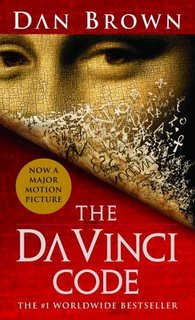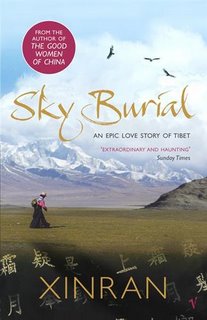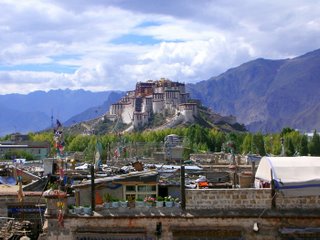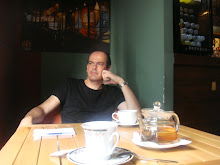
Read the book. Seen the movie. Been there, done that ... and with me, according to this
Wikipedia article, another 60.5 million readers and who knows how many viewers. And counting, of course. 44 translations were made of the original, which, I think is fair to say, should have more than half of the literate world population covered, and I think I'm being conservative here.
Undoubtedly like so many others before me, in the past few days I have been chewing on the question what drives tens of millions of people to go and ...
read a book ?! Weren't we in the age, where paper's major role is to collect dust ? Apparently not just yet. So what is it, that triggered off this tsunami of bibliophilia (if bibliophilia, in any way, could be defined by sheer numbers) ?
I barred out some possibilities for myself:
- It can't be the literary qualities, because (remember: been there ...) in my opinion they are rather poor. I don't believe Dan Brown is in the running for any great literary award, although, to be quite frankly, that is also not what I am looking for foremost in a mystery novel myself. Although if any of you have read Wilkie Collins "The Woman in White", you know it is possible, and in the realm of religious detectives, Browns' bestseller is no match for Umberto Eco's "The Name of the Rose".
- I figured, it also can't be because millions of people currently got interested in what really was decided at the Council of Nicaea or wanted to catch up on their knowledge of the relation between Jezus and the Merovingian kings.
- I could accept that, where the words Opus Dei and Knights Templar fall, some people may suddenly experience a bout of what I would call heightened interest, but for a lot of others they may not even ring the tiniest bell.
So shall we give full credit for this outrageous succes to a plotline, that I would rank as a 10 on the scale of Richter, "pageturner"-wise, that is ? Sure thing, but there are more pageturners out there that will never ever get even 0.1 % of the 182 million results that Google spews out when you search for "The Da Vinci Code". For me there has to be more.
Then is it the Holy Grail, that like the monster of Loch Ness, is bound to come and knock from time to time on our door, in the way urban legends tend to resurface again and again through the ages ? Getting closer, I would say, in view of the fact that the Holy Grail takes on some more inspiring form than a simple winecup. The fact that it is a woman, Mary Magdalene, that gets the story going and that, like Empress Dowager Cixi, she continues to govern the story like from behind a curtain, in my opinion is part of the appeal. The gist however lays in the fact that
she is "casted" as Jesus' wife, mother of his child and heiress to his intellectual legacy.
Allow me at this point to steer clear from all debate on historical accuracy, theological correctness and badly researched blasphemy. Because, what do we get in "The Da Vinci Code" ? He/she who wishes to believe in it, is here presented with a Jesus that is as human as it gets, who is as much like us as we may ever hope him to be: married to a loving wife and father of a child (well, unborn still by the time he died, according to the book). What I believe is happening is that a lot of people are thirsting for a more elaborate spiritual life, but are confused by an icon that walks on water, turns water into wine, has a "father" that basically kills him to set humanity free (I feel no ordinary person really has a clue how to interpret that process) and who by his death freed us from the "original sin", whatever we have to understand from that. Though we may admire what he did, I at least never had the feeling that Jesus was one of our league. Pondering on this issue, I had to think of the Joan Osbourne song "What if God was one of us?" from a couple of years ago.
Indeed, what if ... and this more or less is what we get in this book: the Christ from the Bible becomes the nextdoor Jesus and we may be tempted to believe that what he did, we may be able to do. Are we rewriting history in this way ? Very presumably we do, but it is being done all the time and I for one am not yet convinced that all what is written there by Dan Brown is entirely a hoax and utter nonsense.
I may be way out of line and is the success of the book really and truly and only it's captivating plot, but the 60 million figure keeps spooking through my mind and it keeps saying there is something more out there in the form of an explanation.
Anyway, where does the Church stands in the controversy ? Right where we expect them: on the opposing side, of course. For all the fuzz they have made and are still making, they should have realized at least that the more fuzz there is, the more people will want to know what the fuzz is about. Been there, seen that.
But is the Church not loosing out on an enormous opportunity here to get large numbers of people listening again to what the faith is about ? A momentum has been created from the brain from one author and it resounds in all corners of the world. People are discussing religious affairs in cars, in bars and ... well, euhh ... on the streets.
A positive attitude could have given some direction to that willingness to get in a conversation, but alas ... we have been knocked over with scientific and theological exposes on the mainstream character of the decidedly feminine pictorial representation of Jesus' disciple John among Da Vinci's peers at the time and how only the canonical gospels can be relied upon by a true believer to find the way to God ...
Can we maybe change the tune ? Is somebody listening ... at all ?



















